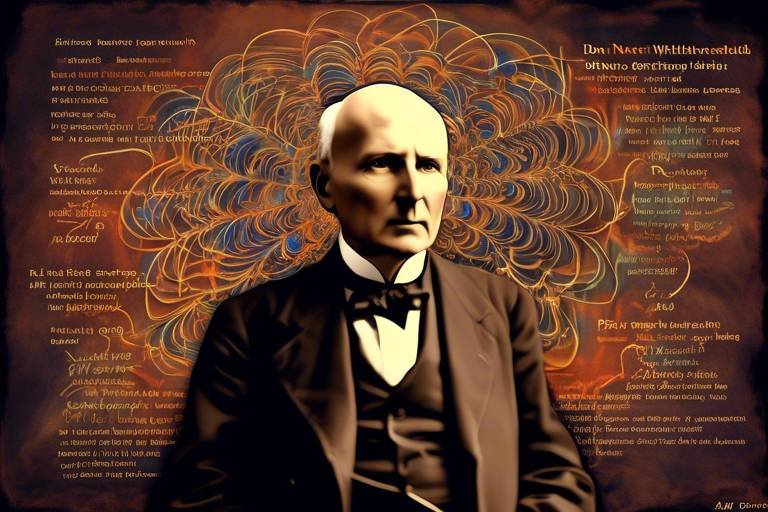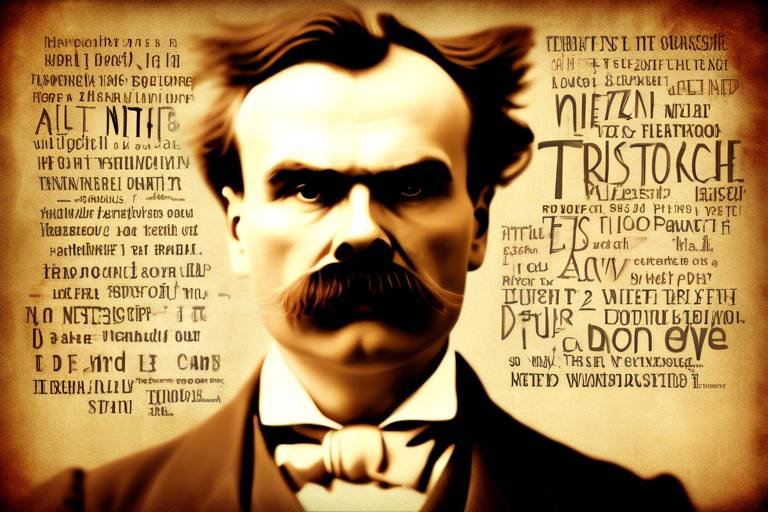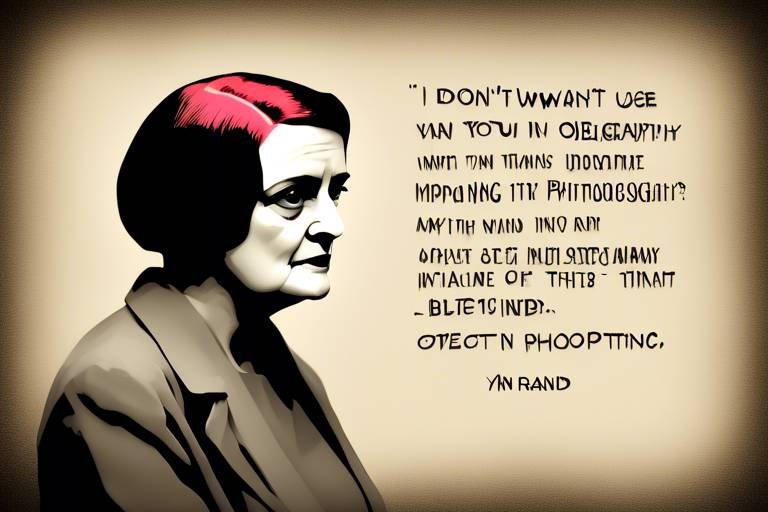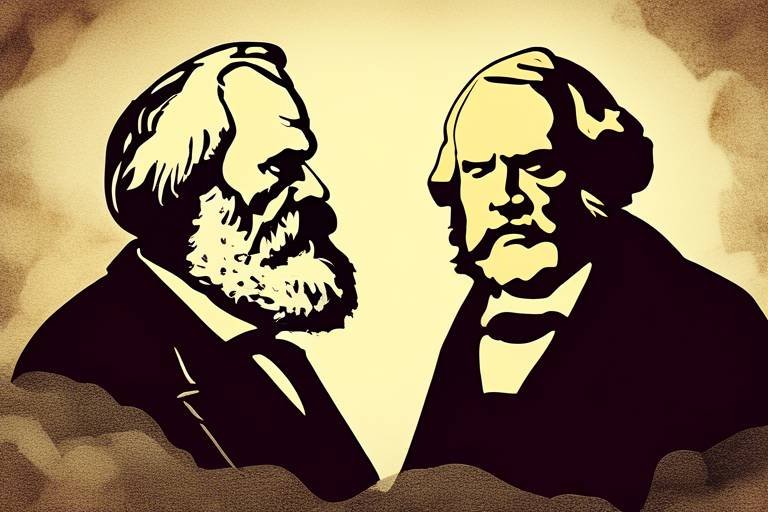Understanding Process Philosophy - Alfred North Whitehead's Perspectives
Have you ever pondered the nature of existence and reality? If so, you're not alone! Many thinkers throughout history have grappled with these profound questions. Among them, Alfred North Whitehead stands out with his groundbreaking ideas in what is known as process philosophy. This philosophical approach emphasizes the importance of change, interconnectedness, and the dynamic nature of reality. In a world that often seems static and unchanging, Whitehead's perspective invites us to view existence as a vibrant tapestry of interactions and transformations.
Process philosophy challenges traditional philosophical notions that prioritize being over becoming. Instead of viewing reality as a collection of unchanging substances, Whitehead encourages us to see it as a continuous flow of events. This perspective not only reshapes our understanding of metaphysics but also influences various fields such as science, religion, and ethics. By embracing the idea that everything is in a state of becoming, we unlock new ways of thinking about our experiences and our place in the universe.
At the heart of process philosophy lies the idea that every entity is defined by its relationships with others. This notion of relationality highlights how interconnected we all are, suggesting that our identities are not isolated but rather shaped by our interactions with the world around us. In this light, Whitehead's philosophy offers a refreshing alternative to the individualistic tendencies of modern thought, urging us to consider the broader context of our lives.
As we delve deeper into Whitehead's ideas, we discover a rich framework that not only enriches our understanding of reality but also prompts us to reconsider our ethical responsibilities. By recognizing the interconnectedness of all things, we may be inspired to adopt a more holistic approach to moral decision-making, taking into account the impact of our actions on the web of life.
In this article, we will explore the historical context that led to the development of process philosophy, outline its core principles, and examine its implications for science, religion, and ethics. Join us on this journey to uncover the profound insights of Alfred North Whitehead and how they resonate in contemporary thought.

Historical Context of Process Philosophy
To truly grasp the essence of process philosophy, we must first dive into the rich historical tapestry that paved the way for Alfred North Whitehead's groundbreaking ideas. The roots of process philosophy can be traced back to a variety of philosophical traditions, including idealism, empiricism, and pragmatism, each contributing to the evolution of thought that culminated in Whitehead's unique perspective. The late 19th and early 20th centuries were particularly fertile ground for philosophical innovation, influenced by rapid advancements in science and a growing awareness of the interconnectedness of all things.
During this period, traditional philosophical paradigms were being challenged by the likes of Charles Sanders Peirce and William James, whose ideas on pragmatism emphasized the practical consequences of thought and action. Their work encouraged a shift from static notions of existence to a more dynamic understanding of reality, which resonated deeply with Whitehead's philosophy. Furthermore, the rise of scientific inquiry during the Industrial Revolution introduced a new lens through which to view the world, one that prioritized change, evolution, and the processes that govern natural phenomena.
Whitehead was also influenced by earlier philosophers such as Immanuel Kant and G.W.F. Hegel. Kant's critical philosophy, which emphasized the role of the observer in shaping experience, laid the groundwork for understanding reality as a relational construct. Meanwhile, Hegel's dialectical method, which focused on the unfolding of ideas through a process of thesis, antithesis, and synthesis, mirrored Whitehead's own views on the nature of change and development. In this light, process philosophy can be seen as a response to the limitations of previous philosophical systems, offering a more fluid and interconnected understanding of existence.
Moreover, the societal changes of the time, including the upheavals brought about by the World Wars, the Great Depression, and the rise of modernism, contributed to a collective yearning for new frameworks of understanding. People were grappling with the chaos of their environments and sought coherent explanations for their experiences. Whitehead's emphasis on process and relationality provided a refreshing alternative to the rigid, mechanistic models that dominated the philosophical landscape.
In summary, the historical context of process philosophy is a rich amalgamation of influences, from earlier philosophical traditions to the seismic shifts in society and science. Whitehead's work emerged as a beacon of thought that not only challenged conventional wisdom but also offered profound insights into the nature of reality. By understanding these historical underpinnings, we can better appreciate the significance of process philosophy in contemporary discourse and its implications for various fields.

Core Principles of Process Philosophy
At the heart of process philosophy, as articulated by Alfred North Whitehead, lies a set of core principles that revolutionize our understanding of reality. Unlike traditional philosophical frameworks that tend to emphasize static being, process philosophy invites us to consider the world as a dynamic interplay of events and relationships. This perspective is not just a minor tweak in philosophical thought; it's akin to switching from viewing a photograph to experiencing a vibrant, flowing video. In this section, we will delve into the fundamental principles of process philosophy, focusing on the notions of becoming, relationality, and the essence of reality as an ever-evolving process.
One of the most striking aspects of process philosophy is the concept of becoming. Whitehead asserts that change is not merely an occasional occurrence; it is the very essence of existence. Imagine life as a river that flows continuously, where every moment is a new experience, and nothing remains the same. In this view, the past, present, and future are interconnected in a dance of becoming. This challenges the traditional notion of being, which often suggests a static, unchanging state. Instead, Whitehead encourages us to embrace the fluidity of existence, recognizing that every entity is in a constant state of flux.
Another cornerstone of process philosophy is relational ontology. Whitehead posits that entities do not exist in isolation but are defined by their relationships with one another. This interconnectedness is crucial for understanding the fabric of reality. For instance, consider how a tree is not just a solitary being; it is part of a larger ecosystem, interacting with the soil, air, and other living organisms. In this sense, every entity is a node in a vast web of relations, and its identity is shaped by the connections it maintains. This perspective invites us to rethink our place in the universe, emphasizing that our actions and interactions have profound implications for the whole.
At the most fundamental level, Whitehead introduces the concept of actual entities, which he describes as the basic units of reality. These entities are not static objects but rather processes of becoming themselves. Each actual entity arises from the interplay of past experiences and future possibilities, contributing to the ongoing evolution of the universe. To visualize this, think of actual entities as individual notes in a symphony; each note is essential, yet it gains meaning through its relationship with the others. This perspective highlights the importance of every moment and every interaction, as they collectively shape the unfolding of reality.
In summary, the core principles of process philosophy challenge us to rethink our understanding of existence. By emphasizing becoming, relationality, and actual entities, Whitehead invites us to engage with the world in a more dynamic and interconnected way. This shift in perspective has far-reaching implications, influencing not only philosophy but also science, religion, and ethics, as we will explore in the following sections.
- What is process philosophy?
Process philosophy is a metaphysical framework that emphasizes becoming and change as fundamental aspects of reality, contrasting with traditional views that focus on static existence. - Who is Alfred North Whitehead?
Alfred North Whitehead was a British philosopher and mathematician, known for his work in process philosophy and for co-authoring the influential book "Principia Mathematica." - How does process philosophy relate to science?
Process philosophy influences scientific thought by promoting the idea that reality is dynamic and interconnected, which aligns with contemporary understandings in fields like biology and physics. - What are actual entities?
In Whitehead's philosophy, actual entities are the basic units of reality, defined by their relationships and processes of becoming rather than static existence.

The Concept of Becoming
The concept of becoming is at the very heart of Alfred North Whitehead's process philosophy. Unlike traditional metaphysics, which often emphasizes a static view of existence, Whitehead invites us to see reality as a dynamic and ever-evolving process. Imagine a river that flows continuously, never the same at any given moment; this metaphor beautifully encapsulates the essence of becoming. Whitehead's philosophy suggests that everything in our universe is in a state of flux, and this change is not merely superficial but fundamental to the nature of existence itself.
In this view, becoming is not just about change; it embodies the idea that every moment is a unique event, shaped by the past while simultaneously influencing the future. Whitehead introduces the notion of “actual entities”, which are the building blocks of reality. These entities are not fixed objects but rather processes that emerge and evolve over time. They are defined by their relationships with one another, highlighting the interconnectedness of all things. This perspective challenges us to rethink our understanding of existence, moving away from a focus on static being to a more fluid conception of reality.
One of the most intriguing aspects of becoming is how it relates to our everyday experiences. Consider the way we grow and change as individuals. Our identities are not static; they are continuously shaped by our interactions, experiences, and the choices we make. In this sense, we are all participants in the grand process of becoming. Whitehead's philosophy encourages us to embrace this fluidity, recognizing that change is not something to be feared but rather an essential aspect of life.
Furthermore, the concept of becoming has profound implications for how we understand time. Instead of viewing time as a linear progression from past to future, Whitehead suggests that time is a series of overlapping events, each contributing to the ongoing process of becoming. This perspective opens up exciting possibilities for how we think about causality and the nature of reality. Rather than seeing events as isolated incidents, we start to perceive them as interconnected moments in a larger tapestry of existence.
To illustrate the concept of becoming further, consider the following key points:
- Dynamic Nature: Reality is not fixed; it is constantly changing.
- Interconnectedness: All entities are defined by their relationships with one another.
- Unique Events: Every moment is a distinct event that shapes and is shaped by the past and future.
- Fluid Identity: Our identities are not static but evolve through our experiences and interactions.
In summary, the concept of becoming is a revolutionary idea that challenges traditional notions of existence. It encourages us to view reality as an intricate web of relationships and processes, where change is not only inevitable but essential. By embracing this perspective, we can gain a deeper understanding of ourselves and the world around us, recognizing that we are all part of a continuous journey of becoming.
Q: What is the main idea behind Whitehead's concept of becoming?
A: The main idea is that reality is dynamic and constantly changing, with every moment being a unique event shaped by past experiences and influencing future outcomes.
Q: How does becoming relate to our personal identities?
A: Our identities are not fixed; they evolve through our experiences and relationships, reflecting the fluid nature of becoming.
Q: What are actual entities in Whitehead's philosophy?
A: Actual entities are the basic units of reality, defined by their relationships and processes, rather than being static objects.
Q: How does the concept of becoming influence our understanding of time?
A: It suggests that time is a series of overlapping events rather than a linear progression, emphasizing the interconnectedness of all moments.

Relational Ontology
At the heart of Alfred North Whitehead's process philosophy lies the concept of , a groundbreaking perspective that challenges the conventional understanding of existence. Unlike traditional philosophies that view entities as isolated, self-contained units, relational ontology posits that the essence of any entity is fundamentally tied to its relationships with others. Imagine a web where each strand represents an entity, and the connections between these strands signify their relationships. This interconnectedness forms the very fabric of reality, suggesting that nothing exists in a vacuum.
Whitehead's view leads us to reconsider how we define ourselves and the world around us. Instead of asking, "What is this thing?" we might more accurately ask, "What is this thing in relation to everything else?" This shift in perspective has profound implications across various fields, from science to ethics. It encourages us to see the world as a dynamic interplay of forces, where change and interaction are the norms rather than exceptions. In this light, the universe is not merely a collection of objects but a vibrant tapestry of relationships that shape and redefine each entity's existence.
Furthermore, relational ontology emphasizes that the interactions between entities are not just superficial; they are essential to their very being. For instance, consider how a tree is not merely a standalone organism but is defined by its relationships with the soil, water, sunlight, and other living beings around it. Each of these relationships contributes to the tree's growth, health, and existence. Thus, understanding an entity also means understanding its context and the myriad connections that sustain it.
To illustrate this concept further, let’s consider some key aspects of relational ontology:
- Interconnectedness: Every entity is part of a larger network, and its identity is shaped by its relations with others.
- Dynamic Interaction: Entities are in a constant state of flux, influenced by and influencing their surroundings.
- Contextual Existence: The meaning and significance of an entity can only be fully understood within its relational context.
This approach not only enriches our understanding of existence but also calls for a more holistic approach to various disciplines. In science, for example, it encourages researchers to look beyond isolated phenomena and consider the broader ecological and relational networks at play. In ethics, it urges us to recognize the impact of our actions on others, fostering a sense of responsibility that extends beyond individualism.
In summary, relational ontology invites us to embrace a worldview where relationships are paramount. By acknowledging the interdependence of all entities, we can cultivate a deeper understanding of existence that resonates with the complexities of life. This perspective encourages us to think more critically about our place in the universe and the ways in which we are all interconnected.
- What is relational ontology? Relational ontology is a philosophical perspective that emphasizes the importance of relationships in defining the essence of entities, suggesting that nothing exists in isolation.
- How does relational ontology differ from traditional ontology? Traditional ontology often views entities as isolated and self-contained, whereas relational ontology sees them as interconnected and defined by their relationships with others.
- What are the implications of relational ontology for science? It encourages scientists to consider broader ecological and relational networks rather than focusing solely on isolated phenomena.
- How does relational ontology influence ethical decision-making? It fosters a sense of responsibility by highlighting the interconnectedness of all beings, encouraging more holistic and inclusive moral considerations.

Actual Entities
In the realm of Alfred North Whitehead's process philosophy, the concept of stands as a cornerstone, representing the fundamental building blocks of reality. Unlike traditional notions that often emphasize static existence, Whitehead's actual entities are dynamic, ever-evolving components that participate in the ongoing process of becoming. Each actual entity is not merely an isolated object; rather, it is a nexus of relationships and interactions, constantly influenced by and influencing its surroundings.
To understand actual entities, it’s essential to appreciate their role in the broader context of Whitehead's thought. He posits that these entities are the moments of experience that constitute the fabric of the universe. Each actual entity arises from the past and contributes to the future, embodying a unique synthesis of influences. This means that every moment in time is not just a fleeting instance; instead, it is a culmination of countless interactions, experiences, and relationships that have shaped it. Think of actual entities as the threads in a vast tapestry, where each thread is essential to the overall design, yet distinct in its color and texture.
Whitehead categorizes actual entities into two primary types: actual occasions and eternal objects. Actual occasions are the concrete instances of experience, while eternal objects represent the potential qualities that can be realized in those occasions. This distinction is crucial because it highlights how actual entities are not merely passive recipients of experience; they actively engage in the process of realization, choosing from a spectrum of possibilities. To illustrate, consider how a painter selects colors (eternal objects) to create a unique landscape (actual occasion). Each brushstroke is a moment of becoming, reflecting both the artist's intention and the inherent qualities of the colors used.
Moreover, the interconnectedness of actual entities leads to what Whitehead refers to as relational ontology. This idea suggests that the identity and existence of each entity are defined by its relationships with others. In this view, nothing exists in isolation; the universe is a vibrant web of connections. For instance, think about how a tree is not just a solitary being but is fundamentally linked to the soil, air, and sunlight. Each of these elements interacts with the tree, influencing its growth and existence. This interconnectedness underscores the importance of viewing reality as a dynamic process rather than a collection of static objects.
In summary, actual entities in Whitehead's philosophy are not just the basic units of reality; they are the very essence of existence itself, embodying change, relationships, and the ongoing process of becoming. By recognizing the significance of actual entities, we can begin to appreciate the complexity and richness of the world around us, where everything is interwoven in a continuous dance of creation and transformation.
- What are actual entities in process philosophy?
Actual entities are the fundamental building blocks of reality in Whitehead's philosophy, representing dynamic moments of experience that contribute to the ongoing process of becoming. - How do actual entities differ from traditional objects?
Unlike traditional objects that are often seen as static and isolated, actual entities are defined by their relationships and interactions with other entities, embodying a dynamic and interconnected reality. - What is the significance of relational ontology?
Relational ontology emphasizes that the identity and existence of entities are shaped by their relationships, highlighting the interconnectedness inherent in the fabric of reality.

Implications for Science
When we dive into the realm of science, the implications of process philosophy become strikingly evident. Alfred North Whitehead's ideas challenge the traditional paradigms that have long dominated scientific thought. Instead of viewing the universe as a collection of static entities, process philosophy invites us to see it as a vibrant tapestry of interconnected processes where change is the only constant. This perspective aligns beautifully with contemporary scientific discoveries that emphasize dynamism over stasis.
In fields such as biology and physics, we find that the notion of static models is increasingly being replaced by an understanding of processes. For instance, in biology, the focus is shifting from merely cataloging species to understanding the interactions and relationships that define ecosystems. This shift reflects Whitehead's assertion that the essence of life lies in its relational dynamics.
Moreover, in physics, the transition from Newtonian mechanics to quantum mechanics exemplifies this evolution. Traditional views treated particles as isolated entities, but quantum theory reveals a world where particles are entangled, and their properties are defined by their relationships with one another. This resonates with Whitehead's idea of actual entities—the basic units of reality that are defined by their interrelations and processes rather than by their individual characteristics.
To illustrate this further, consider the following table that contrasts traditional scientific views with the process-oriented approach:
| Traditional View | Process Philosophy View |
|---|---|
| Entities are static and independent. | Entities are dynamic and interdependent. |
| Focus on isolated systems. | Focus on interconnected systems. |
| Change is an exception. | Change is the norm. |
| Reality is made up of fixed substances. | Reality is a process of becoming. |
As we further explore the implications of process philosophy in science, we uncover a more holistic approach to understanding the universe. This approach encourages a collaborative mindset among scientists, pushing them to consider not just individual components but also the intricate web of relationships that sustain them. By embracing this philosophy, scientists can forge new pathways in research, leading to innovative solutions to complex problems.
In conclusion, the implications of process philosophy for science are profound. They challenge us to rethink our understanding of reality, urging us to embrace a worldview that recognizes the importance of change, relationship, and interconnectedness. As we move forward, it becomes increasingly clear that adopting a process-oriented perspective could lead to groundbreaking discoveries across various scientific disciplines.
- What is process philosophy? Process philosophy is a philosophical approach that emphasizes becoming and change over static being, asserting that reality is fundamentally a process.
- How does process philosophy impact science? It encourages scientists to focus on relationships and dynamic processes, leading to a more interconnected understanding of the universe.
- Who is Alfred North Whitehead? Whitehead was a British philosopher and mathematician known for his work in process philosophy and its implications across various fields.
- What are actual entities? Actual entities are the basic units of reality in Whitehead's philosophy, defined by their interrelations and processes.

Process Philosophy and Religion
The intersection of process philosophy and religion is a fascinating domain that invites us to rethink traditional notions of divinity and spirituality. Alfred North Whitehead, the architect of process philosophy, provides a fresh lens through which to view the divine, emphasizing that God is not a static, unchanging entity but rather a dynamic presence that interacts with the world. This perspective challenges conventional ideas about God’s omnipotence and omniscience, suggesting instead that the divine is deeply relational and responsive to the unfolding of reality.
Whitehead's approach can be likened to a dance between the divine and the universe, where each step influences the other. In this view, God is not a distant observer but an active participant in the process of creation. This relational understanding of God allows for a more intimate connection between humanity and the divine, where prayer and spiritual practices become dialogues rather than monologues. The implications of this view are profound, as they invite believers to engage with God in a more personal and dynamic way.
Furthermore, process philosophy encourages a re-evaluation of religious doctrines and practices. It posits that instead of adhering to rigid dogmas, spirituality should be seen as a living process that evolves over time. This perspective aligns with the contemporary understanding of faith as a journey rather than a destination. By embracing change and uncertainty, individuals can cultivate a more authentic spiritual life that reflects their experiences and insights.
The implications of process philosophy extend beyond individual spirituality; they also affect how communities understand their collective beliefs. For instance, in a process-oriented religious framework, communities might prioritize values such as compassion, interconnectedness, and social justice. This shift in focus can lead to a more inclusive and dynamic practice of faith, where diverse perspectives are valued and integrated into the broader spiritual narrative.
To illustrate this point, consider the following table that compares traditional views of God with those proposed by process philosophy:
| Traditional View | Process Philosophy View |
|---|---|
| Static and unchanging | Dynamic and evolving |
| Omnipotent and omniscient | Relational and responsive |
| Transcendent and distant | Immanent and involved |
| Rigid doctrines | Living traditions |
In conclusion, process philosophy offers a transformative approach to understanding religion and spirituality. By emphasizing the relational nature of God and the dynamic process of faith, it encourages a more engaged and evolving spiritual practice. This perspective not only enriches individual beliefs but also fosters a sense of community that is adaptable and inclusive, inviting everyone to participate in the ongoing dance of existence.
- What is process philosophy? Process philosophy is a school of thought that emphasizes becoming and change as fundamental aspects of reality, as articulated by Alfred North Whitehead.
- How does process philosophy relate to religion? It offers a relational understanding of God, viewing the divine as dynamic and responsive, rather than static and unchanging.
- What are the implications of process philosophy for ethical decision-making? It encourages a holistic approach, recognizing the interconnectedness of all entities and promoting compassionate moral choices.

The Nature of God in Process Thought
When we dive into the nature of God through the lens of process philosophy, as articulated by Alfred North Whitehead, we encounter a radically different understanding than that found in traditional theistic views. Instead of seeing God as a static, omnipotent being who exists outside of time and space, Whitehead presents a vision of God that is deeply intertwined with the dynamic processes of the universe. In this framework, God is not merely a distant creator but an active participant in the unfolding of reality.
Whitehead's concept of God is fundamentally relational. He posits that God experiences the world alongside us, engaging with every event and moment of existence. This means that God's knowledge is not complete in the traditional sense; rather, it is shaped by the experiences of all entities in the universe. In this view, God is constantly influenced by the world, responding to the myriad of events that occur within it. This notion can be quite surprising, as it challenges the classical idea of an unchanging deity, suggesting instead that God evolves with the universe.
To better understand this relationship, let's break down some key aspects of God's nature in process thought:
- Relationality: God is not isolated but is defined by relationships with all entities. This interconnectedness emphasizes that nothing exists in a vacuum.
- Influence: God influences the world while also being influenced by it, creating a dynamic interplay between the divine and the mundane.
- Creativity: God is seen as the ultimate source of creativity, inspiring the potential for new possibilities in every moment.
In this framework, God is not a controlling force but rather a persuasive power, inviting the world toward greater complexity and richness. Whitehead describes God as having two natures: the primordial nature and the consequent nature. The primordial nature embodies the eternal ideals and possibilities for the universe, while the consequent nature represents God's ongoing experience of the world. This duality emphasizes that God is both a source of potential and a participant in the unfolding reality.
Moreover, this understanding of God allows for a more inclusive and flexible approach to spirituality. It opens the door to a view of God that resonates with many contemporary spiritual seekers who find traditional images of God too limiting. By embracing the idea of a relational God, we can foster a sense of connection not only with the divine but also with each other and the world around us.
In summary, Whitehead's process thought presents us with a vision of God that is vibrant, engaging, and deeply interconnected with the fabric of reality. This reimagining of the divine encourages us to reconsider our own relationships with the world, prompting us to see our lives as part of a larger, ongoing process of becoming. As we reflect on these ideas, we are invited to explore the implications of this understanding for our own spiritual journeys and ethical considerations.
- What is process philosophy? Process philosophy is a school of thought that emphasizes becoming and change as fundamental aspects of reality, as opposed to static being.
- How does Whitehead's view of God differ from traditional views? Whitehead sees God as a relational and dynamic participant in the universe, rather than a distant, unchanging creator.
- What are the implications of process thought for ethics? Process thought encourages a holistic view of ethics, emphasizing interconnectedness and the impact of our actions on others and the environment.

Ethical Considerations in Process Philosophy
When we dive into the world of process philosophy as articulated by Alfred North Whitehead, we are not just exploring abstract concepts; we are also uncovering profound ethical implications that resonate deeply in our daily lives. Whitehead’s philosophy encourages us to rethink our moral frameworks by emphasizing the interconnectedness of all entities. In this light, the ethical considerations in process philosophy can be seen as a call to recognize the impact of our actions on the broader web of existence. It's like realizing that every drop of water in an ocean contributes to the vastness of that sea, shaping its currents and ecosystems.
One of the core tenets of process philosophy is the idea of relationality. This principle posits that entities are not isolated; rather, they exist in a network of relationships that define their very essence. Imagine a spider's web, where each thread is a relationship connecting different points. When one thread is pulled, the entire web responds. This analogy illustrates how our ethical decisions should consider the ripple effects they create. In a world where everything is interconnected, the question arises: How can we make decisions that honor this web of relationships? Whitehead suggests that ethical choices must be made with an awareness of their consequences on others, encouraging a shift from self-centered to community-centered thinking.
Moreover, process philosophy pushes us to embrace becoming as a dynamic and ongoing process rather than a static state. This perspective invites us to view ethics not as a rigid set of rules but as a fluid conversation that evolves with our experiences and understanding. For instance, consider how societal norms around issues like climate change or social justice have shifted over time. As new information comes to light, our ethical stances must adapt. Whitehead’s philosophy suggests that being ethical is not about adhering to fixed principles but about engaging in a continual dialogue with the world around us, allowing our morals to grow and change.
In practical terms, this means that ethical decision-making should involve a deep consideration of the following:
- Impact on Relationships: How does my choice affect those around me?
- Long-term Consequences: What will be the ripple effects of my actions in the future?
- Inclusivity: Am I considering the voices and needs of all affected parties?
By adopting this relational and dynamic approach, we can foster a more holistic understanding of ethics that transcends individualism and embraces the communal aspects of our existence. This is particularly relevant in today’s globalized world, where our decisions can have far-reaching effects across cultures and ecosystems. It challenges us to think beyond our immediate surroundings and to recognize our role in the larger narrative of life.
In conclusion, the ethical considerations in process philosophy as proposed by Whitehead compel us to reflect on our interconnectedness and the implications of our actions. It’s a philosophy that asks us to be mindful, to engage in continuous dialogue, and to recognize that our moral choices contribute to the unfolding story of the universe. By embracing this perspective, we can cultivate a more compassionate and responsible approach to our ethical dilemmas, ultimately leading to a more harmonious coexistence.
- What is process philosophy? Process philosophy is a school of thought that emphasizes becoming and change as fundamental aspects of reality, suggesting that everything is interconnected.
- How does process philosophy relate to ethics? It encourages a dynamic and relational approach to ethics, focusing on the impact of our actions on others and the environment.
- What are the implications of process philosophy for science? Process philosophy influences scientific thought by promoting a view of reality that prioritizes dynamic processes over static models.
- Can process philosophy be applied to religious thought? Yes, it offers fresh perspectives on the nature of God and spirituality, emphasizing relationality and interconnectedness.
Frequently Asked Questions
- What is process philosophy?
Process philosophy, primarily articulated by Alfred North Whitehead, is a philosophical framework that emphasizes becoming and change over static being. It suggests that reality is not a fixed entity but is instead a dynamic process shaped by relationships and interactions.
- How does process philosophy differ from traditional philosophy?
Traditional philosophy often focuses on the concept of being and permanence, whereas process philosophy challenges these notions by prioritizing change and relationality. It views the universe as an interconnected web of processes rather than isolated, static objects.
- What are actual entities in Whitehead's philosophy?
In Whitehead's process philosophy, actual entities are the fundamental building blocks of reality. They are the basic units of existence that undergo continuous change and development, highlighting the dynamic nature of the universe.
- How does process philosophy impact scientific thought?
Process philosophy has significant implications for science, particularly in fields like biology and physics. It encourages scientists to focus on dynamic processes and interactions rather than static models, aligning with contemporary understandings of complex systems.
- What is the relationship between process philosophy and religion?
Process philosophy intersects with religious thought by offering a fresh perspective on the nature of God and spirituality. Whitehead's ideas suggest that God is not an unchanging being, but rather a dynamic entity that influences and is influenced by the world.
- How does process philosophy inform ethical decision-making?
Process philosophy promotes a holistic approach to ethics, emphasizing the interconnectedness of all entities. This perspective encourages moral decision-making that considers the impact of actions on the broader web of relationships and processes.



















